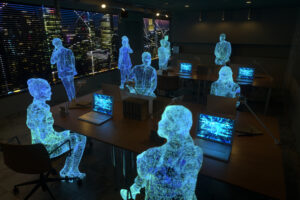
What is the future of events? You only have to read the news to confirm that the advancement of technology is a clear given. With that in mind, could the future of the events industry be limited only by our imaginations? No one knows what time may bring, but half a century from now, it’s certain that profound technological innovation will have radically changed the experiences and expectations of event professionals and the audiences they serve. Join us as we delve into the scenarios and experiences that could shape the landscape of the event sector in the years to come.
Virtual Reality Extravaganzas
Virtual reality (VR) will revolutionise the delegate experience of future events. By donning VR headsets, attendees will be able to transcend physical boundaries by transporting themselves to any location — even to a fictional world. From attending global conferences from the comfort of their homes to exploring simulated environments, VR will offer attendees unlimited possibilities for engagement and connectivity from the comfort of their own home.
Holographic Presenters and Performances
Imagine a future where holographic technology brings renowned speakers and beloved performers back to life — even making it possible for attendees to meet and interact with long-gone icons and celebrities. The incorporation of holographic technology will bring an ethereal touch to events, blurring the lines between reality and the supernatural while enhancing the individual event experience. We can already see this kind of thing starting with Abba Voyage at the O2.
Brain-Computer Interfaces
Advancements in brain-computer interfaces will unlock new dimensions of engagement at events. In the future, attendees could use this technology to control lights, sounds, and visuals with their thoughts, creating an interactive and immersive environment of their own making. From shaping the atmosphere of a room to controlling the flow of presentations, the power of the mind will transform events into deeply personalised and truly unique experiences.
AI-Powered Personal Assistants
Artificial intelligence (AI) will play a significant role in the future event experience. AI-powered personal assistants could be used to anticipate delegates’ needs, provide real-time information, and offer personalised recommendations. These virtual companions will also enhance networking opportunities, facilitate seamless navigation through complex venues, and provide instant translations for global multi-language events.
Sustainable and Self-Sufficient Event Spaces
Future event spaces will be designed with sustainability in mind. As such, these venues will feature advanced energy-capturing systems, self-sustaining ecosystems, and smart waste management facilities. In these spaces, technology and nature will merge seamlessly and harmoniously.
Augmented Reality Networking
Augmented reality (AR) will transform the event networking experience. By donning AR glasses or contact lenses, attendees will be able to instantly view real-time information about their fellow attendees. These AR overlays will display information concerning delegates’ professional backgrounds and shared interests, details that will help to foster meaningful connections and enhance the overall networking potential of events.
Interactive Multi-Sensory Experiences
In order to create unforgettable experiences, events of the future will engage all the senses. Advanced haptic or tactile feedback systems will enable attendees to feel textures, vibrations, and even temperatures while Smell-O-Vision technology will allow scents to be incorporated into environments to enhance and even deepen the emotional feedback of any given event.
While there is no real crystal ball to see into the future, the possibilities for the development of the event industry are boundless. Fifty years from now, the sector will be shaped by advances made in virtual reality, holographic technology, brain-computer interfaces, AI companions, sustainable spaces, augmented reality, and multi-sensory experiences. As these technologies continue to evolve, we can look forward to memorable, meaningful, and valuable experiences — occasions that challenge our imagination to create the kind of transformative moments that resonate for a lifetime.
Running live, virtual or hybrid events? Give your attendees an event experience they’ll remember with technology you can rely on. Learn how Eventsforce can make your next event fabulous and successful. Book your personalised demo now.






